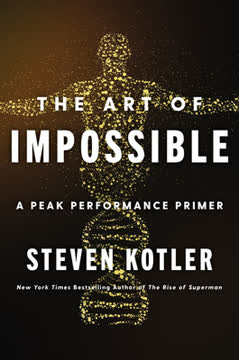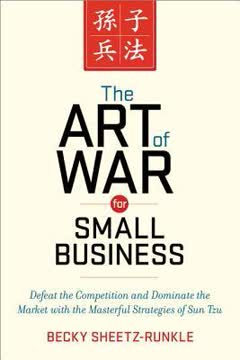Key Takeaways
1. Understand Yourself and Your Adversaries
If you know the enemy and know yourself, you need not fear the result of a hundred battles.
Self-awareness is crucial. Small businesses must thoroughly understand their strengths, weaknesses, and unique value propositions. This self-knowledge forms the foundation for effective strategy and decision-making.
Know your competition. Conduct thorough market research to identify competitors' strengths, weaknesses, and strategies. This intelligence allows you to:
- Exploit their vulnerabilities
- Anticipate their moves
- Differentiate your offerings
Understanding both yourself and your adversaries enables you to make informed decisions, allocate resources effectively, and position your business for success in the marketplace.
2. Leverage Small Business Advantages
Numerical weakness comes from having to prepare against possible attacks; numerical strength, from compelling our adversary to make these preparations against us.
Agility is your superpower. Small businesses have inherent advantages over larger competitors:
- Flexibility to adapt quickly
- Ability to make fast decisions
- Personal touch with customers
- Niche market focus
Turn size into strength. Leverage these advantages by:
- Responding rapidly to market changes
- Providing exceptional, personalized customer service
- Innovating in ways that larger competitors cannot
- Focusing on underserved market segments
By embracing and maximizing these strengths, small businesses can outmaneuver larger competitors and carve out profitable market positions.
3. Build Strong Alliances and Customer Relationships
We cannot enter into alliances until we are acquainted with the designs of our neighbors.
Partnerships amplify power. Strategic alliances can help small businesses punch above their weight class. Carefully select partners who complement your strengths and share your values.
Customer loyalty is king. Develop deep, meaningful relationships with your customers:
- Understand their needs intimately
- Provide exceptional value and service
- Create a community around your brand
Strong alliances and customer relationships provide:
- Access to new markets and resources
- Increased credibility and reach
- A stable foundation for growth
- Protection against competitive threats
By fostering these connections, small businesses can create a powerful ecosystem that supports their success and sustainability.
4. Focus on Strategic Positioning
The spot where we intend to fight must not be made known; for then the enemy will have to prepare against a possible attack at several different points.
Choose your battles wisely. Strategic positioning is about selecting the right markets, products, and competitive approach. Focus on areas where you can dominate rather than competing head-on with industry giants.
Differentiate or die. Create a unique value proposition that sets you apart:
- Identify underserved market niches
- Develop innovative products or services
- Offer superior quality or customer experience
Key elements of effective positioning:
- Clear understanding of target customers
- Compelling brand story and messaging
- Consistent delivery of your unique value
By carefully choosing where and how to compete, small businesses can create defensible market positions and achieve sustainable growth.
5. Adapt and Innovate Continuously
Water shapes its course according to the nature of the ground over which it flows; the soldier works out his victory in relation to the foe whom he is facing.
Embrace change as opportunity. The business landscape is constantly evolving. Successful small businesses must be willing to:
- Pivot when necessary
- Experiment with new ideas
- Learn from failures
Innovation is survival. Foster a culture of continuous improvement and creativity:
- Encourage employee input and ideas
- Stay attuned to emerging trends and technologies
- Regularly reassess and refine your business model
Examples of successful adaptation:
- Netflix transitioning from DVD rentals to streaming
- Zappos revolutionizing online shoe retail with exceptional service
- Chobani creating a new yogurt category in a mature market
By remaining flexible and innovative, small businesses can stay ahead of the curve and outpace larger, slower-moving competitors.
6. Maintain Unity and Inspire Your Team
The clever combatant looks to the effect of combined energy, and does not require too much from individuals. Hence his ability to pick out the right men and utilize combined energy.
Unity is strength. A cohesive team aligned around a shared vision is a powerful force. Foster unity by:
- Clearly communicating your mission and values
- Encouraging collaboration and open communication
- Recognizing and rewarding team achievements
Inspire greatness. Leadership in small businesses is about bringing out the best in your people:
- Lead by example
- Provide opportunities for growth and development
- Create a positive and supportive work environment
Benefits of a unified, inspired team:
- Increased productivity and innovation
- Higher employee retention and satisfaction
- Improved customer service and business outcomes
By creating a strong, unified culture, small businesses can punch above their weight and achieve remarkable results.
7. Execute with Precision and Timing
Energy may be likened to the bending of a crossbow; decision, to the releasing of a trigger.
Timing is everything. Success often hinges on executing the right moves at the right time. Develop the ability to:
- Recognize market opportunities
- Act decisively when the moment is right
- Avoid premature or delayed action
Precision in execution. Flawless implementation of strategy is crucial:
- Set clear goals and metrics
- Develop detailed action plans
- Monitor progress and adjust as needed
Key elements of effective execution:
- Strong project management skills
- Clear roles and responsibilities
- Regular communication and feedback loops
By combining precise execution with impeccable timing, small businesses can maximize the impact of their limited resources and achieve outsized results.
8. Master the Art of Deception and Intelligence
All warfare is based on deception.
Information is power. Develop robust intelligence-gathering capabilities to stay ahead of competitors and market trends. Sources of intelligence include:
- Customer feedback and interactions
- Industry events and publications
- Social media and online forums
- Competitive analysis
Strategic deception. While maintaining ethical standards, small businesses can use deception to gain competitive advantage:
- Keep your plans and intentions hidden
- Create uncertainty about your capabilities and intentions
- Use misdirection to throw off competitors
Ethical ways to leverage deception:
- Selective sharing of information
- Creating an appearance of strength or weakness
- Using surprise and unpredictability in your strategies
By mastering the art of intelligence and strategic deception, small businesses can level the playing field against larger competitors and create opportunities for success.
Last updated:
FAQ
1. What is "The Art of War for Small Business" by Becky Sheetz-Runkle about?
- Modern Application of Sun Tzu: The book adapts Sun Tzu’s ancient military strategies from "The Art of War" specifically for small business owners and entrepreneurs.
- Competing Against Larger Rivals: It focuses on how small businesses can outmaneuver, outthink, and outperform larger, better-funded competitors using strategic thinking.
- Practical Business Examples: The author provides real-world case studies and examples of small businesses applying Sun Tzu’s principles to achieve market dominance.
- Comprehensive Guide: The book is structured to guide readers from foundational concepts to advanced strategies, making Sun Tzu’s wisdom actionable for today’s business challenges.
2. Why should I read "The Art of War for Small Business" by Becky Sheetz-Runkle?
- Tailored for Small Business: Unlike generic business books, it directly addresses the unique challenges and advantages of small businesses.
- Actionable Strategies: The book translates ancient military tactics into practical business moves, offering step-by-step guidance.
- Learn from Success Stories: It features case studies of companies like Five Guys, Chobani, Zappos, and PayPal, showing how they used Sun Tzu’s methods to grow.
- Gain a Competitive Edge: Readers learn how to leverage agility, innovation, and alliances to outperform larger competitors.
3. What are the key takeaways from "The Art of War for Small Business"?
- Know Yourself and the Enemy: Deep self-awareness and competitor analysis are essential for success.
- Leverage Small Business Advantages: Agility, innovation, niche focus, and alliance-building are powerful tools against bigger rivals.
- Strategy Over Tactics: Long-term planning and adaptability trump short-term, reactive moves.
- Win Without Fighting: The best victories come from outmaneuvering competitors, not direct confrontation.
- Adapt and Persevere: Flexibility, resilience, and the ability to turn disadvantages into advantages are critical for survival and growth.
4. How does Becky Sheetz-Runkle adapt Sun Tzu’s "The Art of War" for small business strategy?
- Direct Translation to Business: She interprets Sun Tzu’s five constant factors (Moral Law, Heaven, Earth, Commander, Method/Discipline) for business contexts.
- Focus on Underdogs: The book emphasizes how smaller forces can defeat larger ones by exploiting weaknesses and avoiding strengths.
- Modern Case Studies: She illustrates each principle with contemporary business examples, making the ancient text relevant and practical.
- Emphasis on Alliances and Innovation: The adaptation highlights the importance of partnerships, customer intimacy, and creative problem-solving.
5. What are the main advantages and disadvantages of small businesses according to "The Art of War for Small Business"?
- Key Advantages: Agility, speed, flexibility, innovation, niche exploitation, close customer relationships, and unity of purpose.
- Common Disadvantages: Limited resources, less cash flow, lack of structure, less experienced leadership, and vulnerability to being outmuscled by larger competitors.
- Double-Edged Traits: Some characteristics, like risk-taking and lack of hierarchy, can be both strengths and weaknesses depending on context.
- Strategic Implications: Recognizing and leveraging advantages while mitigating disadvantages is central to Sun Tzu’s approach for small businesses.
6. How does "The Art of War for Small Business" recommend understanding yourself, your enemy, and your market?
- Brutal Self-Honesty: Leaders must confront false assumptions and validate their business models with real-world data.
- Deep Competitor Analysis: Know your competitors’ strengths, weaknesses, and likely moves to find exploitable openings.
- Market Awareness: Understand the terrain—customer needs, market trends, and timing—to position your business advantageously.
- Continuous Learning: Regularly reassess your own capabilities, the competition, and the market to stay ahead.
7. What are Sun Tzu’s five constant factors and how do they apply to small business in this book?
- Moral Law (The Way): Cultivate unity of purpose and strong company culture to inspire loyalty and commitment.
- Heaven (Timing): Recognize and act on the right timing for moves, considering market cycles and external conditions.
- Earth (Terrain): Assess the business landscape, including opportunities, threats, and the competitive environment.
- The Commander: Embody leadership virtues—wisdom, sincerity, benevolence, courage, and strictness—to guide your team.
- Method and Discipline: Implement clear structures, processes, and disciplined execution to maximize efficiency and effectiveness.
8. What leadership qualities does Becky Sheetz-Runkle highlight from Sun Tzu for small business owners?
- Wisdom: Make informed, strategic decisions and maximize limited resources.
- Sincerity: Be consistent, keep your word, and unite your team around a clear cause.
- Benevolence: Treat employees, partners, and even former competitors with respect and fairness.
- Courage: Take calculated risks, act decisively, and maintain focus on objectives.
- Strictness: Enforce discipline, maintain hierarchy, and avoid the five dangerous faults (recklessness, cowardice, hasty temper, excessive honor, over-solicitude for employees).
9. How does "The Art of War for Small Business" advise on building alliances and leveraging relationships?
- Strategic Partnerships: Form alliances with vendors, customers, and even competitors to close resource gaps and expand reach.
- Due Diligence: Carefully vet partners to ensure alignment of interests and avoid conflicts.
- Community Building: Engage customers and employees to create a loyal, passionate base that supports growth.
- Turning Rivals into Allies: Treat acquired competitors’ employees well and consider friendly takeovers to expand your business.
10. What does "The Art of War for Small Business" say about focus, unity, and execution?
- Single-Minded Focus: Concentrate resources on core strengths and profitable opportunities; avoid being all things to all people.
- Unity of Purpose: Foster a shared mission and culture to align and energize your team.
- Consolidate Gains: After victories, fully leverage achievements and avoid wasting resources on unfocused activities.
- Flawless Execution: Success depends on consistent, disciplined follow-through and learning from both wins and losses.
11. How does the book address adaptation, innovation, and dealing with change?
- Embrace Flexibility: Be willing to pivot strategies and tactics as circumstances change.
- Water Metaphor: Like water, adapt your approach to the terrain and flow around obstacles.
- Continuous Improvement: Regularly innovate and make incremental improvements to stay ahead of competitors.
- Disruptive Thinking: Look for opportunities to serve unmet needs or disrupt established markets, as seen in examples like PayPal and Netflix.
12. What are the best quotes from "The Art of War for Small Business" and what do they mean?
- "If you know the enemy and know yourself, you need not fear the result of a hundred battles." — Emphasizes the importance of self-awareness and competitor analysis.
- "In war, the way is to avoid what is strong and to strike at what is weak." — Advises small businesses to exploit competitors’ vulnerabilities rather than confront their strengths.
- "Standing on the defensive indicates insufficient strength; attacking, a superabundance of strength." — Encourages proactive, growth-oriented strategies over mere survival.
- "Win first." — Advocates for thorough preparation and confidence before engaging in competitive battles.
- "Be flexible and decide your line of action according to the situation on the enemy side." — Stresses the need for adaptability and responsiveness to changing conditions.
Review Summary
Readers find The Art of War for Small Business a mixed bag. Some praise its application of Sun Tzu's principles to business, highlighting useful strategies and case studies. Others criticize it for being repetitive or lacking depth. Positive reviews note its relevance for small business owners, clear explanations, and timeless lessons. Criticisms include shallow insights and excessive padding. Overall, the book receives moderate praise for its concept but mixed reactions on execution. Many suggest reading the original Art of War for fuller context.
Similar Books








Download PDF
Download EPUB
.epub digital book format is ideal for reading ebooks on phones, tablets, and e-readers.





